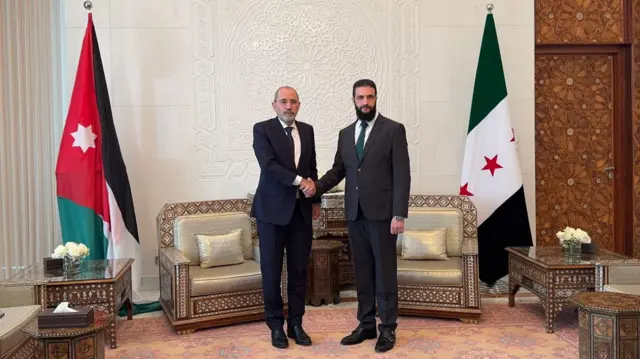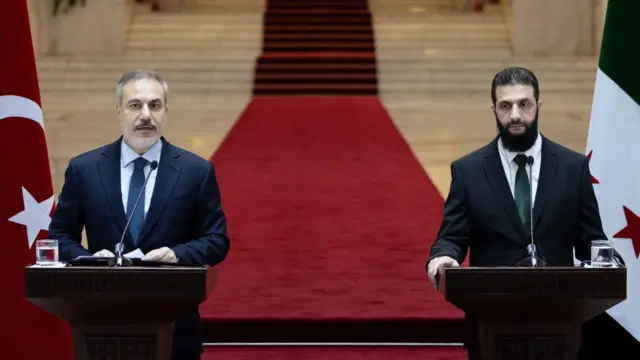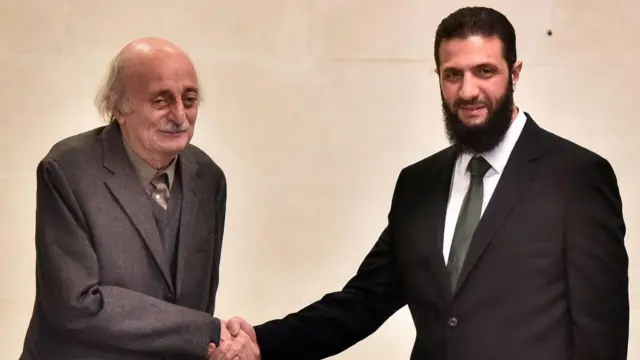
image source, Jordanian Ministry of Foreign Affairs and Expatriate Affairs
On Monday, Jordanian Deputy Prime Minister and Foreign Minister, Ayman Al-Safadi, held extensive discussions with the Commander-in-Chief of the new administration in Syria, Ahmed Al-Sharaa.
And he said Al-Safadi, in press statements he made in Damascus, after the discussions, said that rebuilding Syria is important for Jordan and the region as a whole. He stressed Jordan’s readiness to provide all forms of support to Syria and assist it in the reconstruction process.
Al-Safadi also expressed his hope that there will be a government that represents all sects in Syria, stressing that Jordan will always stand by the Syrian people.
Al-Safadi indicated during his statements that he discussed with Al-Sharaa ways of support that Jordan can provide to the Syrian people, in addition to discussing the security aspect and combating terrorism.
He also stressed Jordan’s keenness to provide all means of support to Syrian refugees, stressing that their return to their country must be voluntary.
He added: “We support the transitional process in Syria and the drafting of a new constitution for the country.”
Al-Safadi’s visit to Damascus today, Monday, will be the first visit by an Arab foreign minister during which he will meet with the Commander-in-Chief of the new administration in Syria and a number of Syrian officials.
On Sunday, Al-Sharaa met in Damascus with the Turkish Foreign Minister, Hakan Fidan, and the Lebanese Druze leader, Walid Jumblatt, as part of the new regime’s effort to strengthen its relations with the outside world.
Al-Sharaa said, during a joint press conference with the Turkish Foreign Minister, that his administration will announce the new structure of the Ministry of Defense and the Army within days.
He added that his administration would not allow the presence of weapons outside the control of the state, including those held by the Kurdish-led Syrian Democratic Forces (SDF), which cause concern to Ankara.

image source, Getty Images
During his meeting with the Turkish Foreign Minister, Al-Sharaa said that the armed factions in the country will soon begin announcing their dissolution and entry into the Syrian army, without mentioning an exact timetable for that.
Al-Sharaa did not speak, on Sunday, December 22, about appointing a Minister of Defense in the new administration, but Reuters news agency quoted an official source, on Saturday, that “Murhaf Abu Qasra,” a prominent figure in the rebellion that overthrew Bashar al-Assad’s regime two weeks ago, Candidate for the position of Minister of Defense in the interim government.
The official Syrian News Agency (SANA) said that Al-Sharaa discussed the form that the military institutions will take, during a meeting with armed factions on Saturday.
“Only the Syrians overthrew Assad.”
For his part, Turkish Foreign Minister Hakan Fidan said that only the Syrians overthrew the regime of former President Bashar al-Assad.
Fidan said, addressing the Syrians: “This victory is yours and does not belong to anyone but you. Thanks to your sacrifices, Syria seized a historic opportunity.”
It is noteworthy that Ankara was the main supporter of the opposition Hay’at Tahrir al-Sham, which took control in Syria earlier this month. But Türkiye denies its involvement in the lightning attack launched by opposition factions over a period of 12 days, which ended with the overthrow of Assad on December 8.
On the other hand, Fidan stressed that there is no place for Kurdish People’s Protection Units militants in Syria’s future, and that it must be dismantled. He also called for the necessity of lifting all sanctions imposed on Damascus to rebuild the country.
Turkey considers the Kurdish People’s Protection Units (YPG) – the main component of the US-backed Syrian Democratic Forces, which controls vast swaths of northern and northeastern Syria – to be linked to the Kurdistan Workers’ Party (PKK), which has been waging an armed insurgency against the Ankara government since the 1980s.
Fidan continued: “The international community must mobilize all its efforts until Syria rises and the displaced return to their country.”
“Protection of minorities”
Ahmed Al-Sharaa stressed the work to protect minorities, stressing the importance of coexistence in the multi-ethnic and multi-sectarian state, after the overthrow of the Assad regime.
Al-Sharaa said during the press conference with the Turkish Foreign Minister: “We are working to protect the sects and minorities from falling apart among them, or exploiting this scene as one of the external tools to incite sectarian strife,” adding, “Syria is a country for everyone and we can coexist with each other.”
Al-Sharaa also sought to reassure minorities during his meeting with Lebanese Druze leader Walid Jumblatt, on Sunday in Damascus.
Al-Sharaa said that Syria will no longer witness the exclusion of any sect, and that a new era “far from the sectarian situation” has begun.
He continued during the meeting with Jumblatt, in comments broadcast by Lebanese media: “With our pride in our culture, our religion, and our Islam… the existence of Islam does not mean the abolition of other sects. On the contrary, it is our duty to protect them.”
“New relations between Syria and Lebanon”

image source, AFP
During the meeting with Jumblatt, Al-Sharaa pledged to put an end to “negative” Syrian influence in Lebanon.
He stressed that “Syria will not be a case of negative interference in Lebanon at all, and will respect Lebanon’s sovereignty, territorial integrity, independence of its decision-making and security stability,” and “will stand at the same distance from everyone” in the next stage after it “was a source of anxiety and inconvenience” in Lebanon.
Al-Sharaa pledged that “there will be a new history in Lebanon that we build together, without cases of violence and assassinations… and I hope that the previous Syrian memory in Lebanon will be erased.”
For his part, Jumblatt said during the meeting that the overthrow of Assad will open the door to new constructive relations between Lebanon and Syria.
The Druze leader said: “We hope that all those who committed crimes against the Lebanese will be held accountable… and we hope that fair courts will be established for those who committed crimes against the Syrian people. How do you know what those crimes were?”
Walid Jumblatt accuses Syria of assassinating his father, Kamal Jumblatt, during the Lebanese Civil War in 1977, during the era of the late Syrian President Hafez al-Assad.
During the rule of the Assad family, which extended for more than fifty years, Damascus was accused of assassinating Lebanese leaders opposed to Syrian intervention in their country.
The Syrian army entered Lebanon in 1976, as part of Arab forces to help stop the civil war there.
But the Syrian army became an active party in the battles, before Damascus became the “guardian force” over Lebanese political life, controlling all its aspects, until 2005.
In that year, its forces left Lebanon under popular pressure, after the assassination of former Prime Minister Rafik Hariri, in an explosion in which Damascus was blamed, and later on its ally, Hezbollah.
ظهرت في الأصل على www.bbc.com

